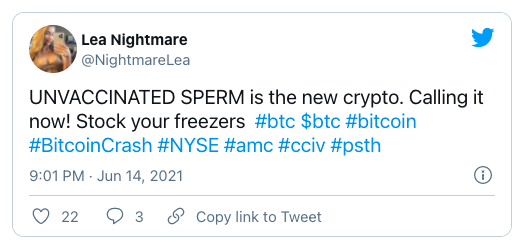Is unvaccinated sperm really the next Bitcoin?

Unvaccinated sperm is the next Bitcoin, they say. After all, the world’s top crypto is an “apocalyptic safe haven” in which to store value before the world collapses into a Mad Max-meets-Johnny Mnemonic operatic hellscape.
The notion that unvaccinated sperm price will outperform Bitcoin and gold has floated around Twitter since COVID-19 vaccines rolled out earlier this year.
Propaganda-powered accounts amplifying anti-vax disinformation have memefied the idea, latching onto Bitcoin’s growing presence in the mainstream zeitgeist for engagement.

The meme goes: COVID-19 vaccines will go so terribly wrong that baby-crazy women will be forced to pay top dollar for sperm from men who’ve opted out of The Great Reset.
“Unvaccinated sperm counts [sic] could rise faster than Bitcoin,” tweeted one such account, boosting another which said “men who refuse the [vaccine] are the hottest men on planet [Earth].”
“We straight broads [love] men who refuse to bend the knee [and] kiss the ring of medical tyranny.”

Indeed, unvaccinated sperm hype is increasingly placed beside pro-Brexit shitposts on propagandized timelines across Twitter.
All this while Sweden (like the US) suffers intense semen shortages. Donors have avoided hospitals due to the coronavirus pandemic, delaying inseminations and “driving up wait times by years,” relayed Reuters in April.
“We’re running out of sperm. We’ve never had so few donors as during the last year,” said the head of Gothenburg’s University Hospital reproduction unit to reporters (our emphasis).
So, could unvaxxed jizz really be the next crypto?
All sperm is unvaccinated sperm
The idea that sperm carries COVID-19 antibodies or other foreign components (like a trigger for autism, or Bill Gates’ listening device) is wrong.
A lot of the confusion is over something called vaccine shedding, a common theme in the anti-vax playbook. This refers to the process of releasing a virus into the human body, so it can learn how to fight it (a “live virus vaccine”).
But all the COVID vaccines do not release their components into or outside of the body.
In fact, the vaccines don’t even enter the nucleus, where DNA is stored — providing them no avenue to modify genes.
“Vaccine shedding can only occur when a vaccine contains a weakened version of the virus. None of the vaccines authorized for use in the United States contain a live virus,” says the CDC.
“Vaccine components are not shed by COVID-19 vaccines, so it is not possible for the any of the vaccine components to accumulate in the body’s tissue or organs, including the ovaries.”
This also means there’s no evidence indicating the vaccines affect male (or female) fertility.

- Shedding is characteristic of live-attenuated vaccines.
- mRNA, viral vector, and protein subunit vaccines do not shed.
- The COVID-19 vaccines are all either mRNA, viral vector, or protein subunit (no shedding).
Again, this means the COVID-19 vaccines don’t alter our genetic material (DNA) and is no different to unvaccinated sperm. They contain harmless proteins that trigger a response in our immune system.
Our systems break down those proteins and flush them out.
‘High quality sperm’ is real
While there’s no evidence to suggest that unvaccinated sperm price should be any different to vaccinated spunk, the concept of markets preferring “high quality sperm” is true.
A few years back, Vice noted that single vials of sperm sold for $370 to $890 on what’s known as the “fertility market,” depending on quality of the DNA.
According to Vice, sperm is not a “low-demand and high supply market.” Those looking to make babies in vitro really do want the highest quality semen available: “college educated sperm that is free of disease and physical abnormalities.”

[Read more: What happened to the Lifeboat Foundation’s Bitcoin Endowment Fund?]
And so, determining which sperm is the good sperm takes a lot of legwork (and testing).
Prices across the board had reportedly risen $55 per vial from 2015 and 2016. One doctor said developments in testing technology had contributed: “cost does vary and goes up over time, just like everything.”
Update 14:27 UTC, June 24: Added context about unvaccinated sperm fertility in paragraph 17.
Looking for bite-sized news? We’re on Twitter.
